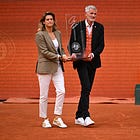The Final Score
Women's relegations—and frustrations—have added up at Roland Garros.

PARIS, France — After writing about it early in the tournament, I thought it was the right time to close the loop on the talk of scheduling at Roland Garros.
Now that the order of play has been released for Day 11, which is the last day…




